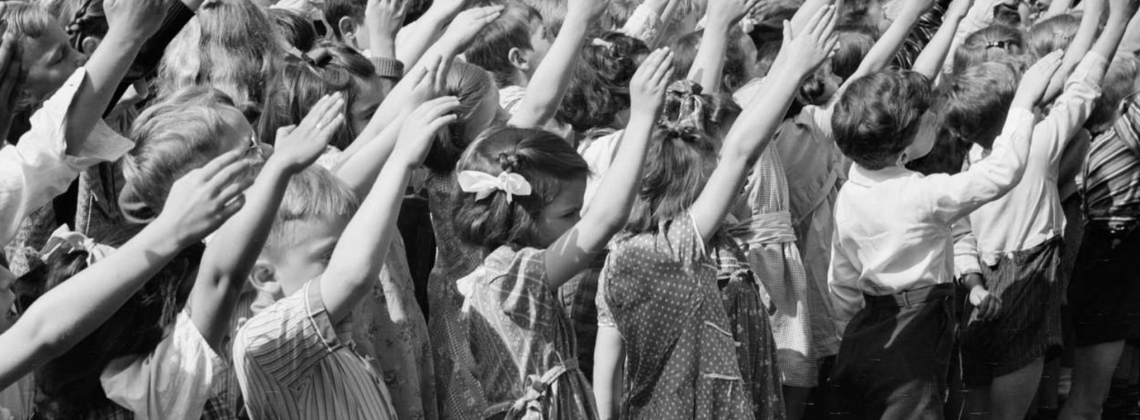

“I don’t believe the honest man is forced to submit to history”
Some people binge-watch their favorite show on Netflix. This spring and summer I binge-read the works of twentieth-century Italian novelist Ignazio Silone. Whether it’s novels such as Fontamara and Bread and Wine, or nonfiction works such as Memoir from a Swiss Prison, Silone’s voice resonates loudly in our present age.
For example, I just finished Silone’s The School for Dictators, a satirical analysis of German and Italian fascism published in 1938. The story begins with two Americans plotting a fascist takeover of the United States. One is a charismatic political leader named Mr. W. The other is Professor Pickup, Mr. W’s academic sidekick who is in search of an intellectual justification for such a coup d’etat.
The two men have been traveling through Europe preparing for their fascist revolt and seeking, in what Silone calls a “school for dictators,” the wisdom of political philosophers. When they arrive in Switzerland they encounter Thomas the Cynic, a fellow student of fascism. Most literary critics agree that the character of Thomas channels the voice of Silone, who at the time of The School for Dictators’ publication was living in exile in Zurich and participating in the resistance movement against Mussolini.
Thomas the Cynic provides Mr. W and Professor Pickup with several pieces of advice for turning the United States into a fascist nation. Here are a few of them.
1. Encourage anti-intellectualism. Thomas the Cynic tells Mr. W that if he wants to be a dictator he will “have to get used to quotations” because “a dictatorship is a regime in which people quote instead of think.” According to Thomas, the rise of “mass media” will lead people to embrace “an attitude and outlook” that conforms “increasingly to a single pattern and they [will] become incapable of using their brains.” Fascism cuts off all conversation about the human condition—the lifeblood of intellectual pursuit. Any “invitation to discuss” must “be rejected.”
2. Undermine moral standards, especially among lawmakers. A successful fascist will build power by appealing directly to the people. In the process, the members of the legislature—”those old windbags squabbling over trifles”—will lose power and purpose. And, Thomas the Cynic says, “as the legislative function declines, it is inevitable that the average moral standard of the legislator will also decline.” These lawmakers will “no longer care about anything except getting elected,” and “in order to repay the favors of the pressure groups on whose support their re-election depends” will “need the good will of the administration.”
3. Pursue power for power’s sake. Thomas the Cynic advises Mr. W that he should not seek power for the purpose of implementing ideas or policy. Instead, he should obtain “power for power’s sake.” For the fascist dictator, “all voluptuousness lies . . . in the exercise of power.” Thomas adds: “Ideas, reforms, peace, war, money, women, horses, exist for him as instruments or objects of power, not the reverse.” And since all the dictator’s faculties are concentrated on obtaining power, he will likely appear to the masses as an “extraordinary man.” Any leader narcissistic enough to pursue power in this way must be a man “desperately anxious to succeed, a born rabble-rouser, having at his disposal a mass of beggars, failures, misfits, bullies, [and] a mob which has mutinied against the ruling class and against the traditional parties.”
4. Develop a spiritual connection with loyal followers. The dictator’s most devout followers see him as the “chosen one”—a “transfigured” man, a “dream-personality, and an “individualized product of an irresistible collective need.” Once the dictator has convinced a significant portion of the people to see him in God-like terms, his followers will refuse to accept any criticism of him. As Thomas the Cynic puts it: “If you criticize the leader in the presence of a believer, it is as though you were attacking the sublimated part of his own nature, from which he draws the consolation he needs to endure the hardships of his wretched existence.” The relationship between the dictator and his loyal followers is not “ideological,” “programmatical,” or “ethical.” It is built instead upon the same kind of obedience that a member of a religious cult pays to his or her leader. “If my leader behaves that way,” the loyal follower says, “he must have his own good reasons for doing so.” The follower wants to experience the leader’s power, to bask in the light of his movement, and to take pride in his ability to “wipe out his adversaries.” The power he holds over his followers is spiritual in nature.
5. Rewrite national history. Thomas the Cynic explains to Mr. W and Professor Pickup how Benito Mussolini constructed a national myth, rejected by Italian historians (including some fascist historians), that the modern history of Italy could be traced directly to classical antiquity. He led his followers to believe that he and his Black Shirts were “nurturing the traditions of ancient Rome” and restoring Italy to its former glory. Thomas tells Mr. W that Italian soldiers died fighting in Spain and Ethiopia because they believed in this tale. Such myths are “the personification of a collective desire” and leaders peddle them through a process that is “hypnotic” in nature. Whether the myth is true or reflective of good historical scholarship is always a question of “secondary importance.”
6. Create political chaos. When the people lose confidence in traditional institutions it will lead to a “paralysis of the democratic state, that is to say, an irremediable breach between the old political system on the one hand and a radically transformed social system on the other.” At first the people will see the party operating from inside the old political system as the “only party capable of establishing a new order” amid the confusion. But in the end, Thomas the Cynic argues, the traditional party “will prove itself inadequate for the difficult task, and, in fact, by disappointing the hopes placed in it, will merely add to the already existing anarchy.” It is at this point, when everyone is “at the end of his tether,” that a totalitarian party “bursts upon the scene,” portraying the traditional party as “responsible for all the nation’s ills” and worthy of “hatred.” If the fascist leader isn’t “a complete imbecile,” Thomas notes, “he stands a good chance of getting into power.” And once he is in power he will transition from a politician of chaos to a politician of law and order.
Near the end of The School of Dictators, Professor Pickup asks Thomas the Cynic why he is opposed to totalitarian governments if he believes they are “the great trend of our epoch.”
Thomas responds: “I don’t believe that the honest man is forced to submit to history.”
John Fea is Executive Editor of Current
Wow… I’m almost speechless how immediate and in the present this is… numerous family, friends are all there, in the place of the frenzied follower and I have no idea how to direct them away from the abyss they’re running towards…
At the outset I must say that Donald Trump
just doesn’t have it to be a Fascist dictator !!!
He is so third rate that Hitler is turning over in his grave !! Donald doesn’t know how to rule as a dictator !!
My definition of a true, ruthless Fascist dictator calls for the following : A Machiavellian personality to manipulate others; Donald doesn’t have the intelligence to do so !! He doesn’t even know how to spell “ cunning “!! Benito Mussolini is a class act !!
Since we do not have a totalitarian State and since Donald is an imbecile, he wouldn’t know how to create a one party , suspend liberty and glorify faith in war and destruction !!
Need I say more ?! How lucky we are ; those who believe in two parties, democratic elections and uphold our Constitution and civil liberties ! Three cheers to my Old Glory 👏👏!!
Cheers.
I’m late to the party reading this, and now I’m absolutely stunned. Thank you for helping me understand how history does repeat itself. I’ve tried and tried to understand the devotion to Trump, this helps (as have your book and other articles). I don’t believe I will ever fully ‘get it’, because I don’t have that kind of faith in any human being. Scary times.
Thanks, Mary. And you are hardly late to the party! The piece just came out on Thursday.
Silone could have written school for dictators in 2020.
Another good read for this moment is Gellately’s, Hitler’s True Believers. I’m haunted by the initially reluctant German who told his son, “There must be order” when he finally threw his support behind Hitler in 1933.
You might be interested in my book
“Bitter Spring: A Life of Ignazio Silone” published by Farrar, Straus and Giroux
https://us.macmillan.com/books/9781429957779/bitterspring
It won several awards in the US, UK, and Italy
I also translated “Memoir of a Swiss Prison” from Italian into English.
And here is my NYT Op-Ed: https://www.nytimes.com/2009/04/07/opinion/07pugliese.html
I am a professor of history at Hofstra University
stanislao.pugliese@hofstra.edu